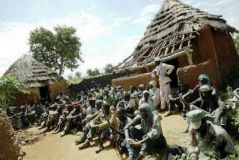Darfur rebels say no more negotiations before trial of ‘criminals’
ASMARA, March 10 (AFP) — The two main rebel groups in western Sudan’s Darfur region said Thursday there would be no further negotiations with Khartoum until “criminals” who committed atrocities in the strife-torn area face trial by an international court.

|
|
Sudanese Liberation Army rebels from different bases come together for a meeting in Tarenjer village, west Darfur, October 11, 2004. (Reuters). |
The rebels also said they were calling for a mediation by the United Nations and Eritrea to settle the crisis in Darfur, where fighting between government forces and opposition movements started in February 2003.
The Sudan Liberation Movement (SLM) and the Justice and Equality Movement (JEM) said they would “resume the negotiations only after the apprehension and trial of the criminals in an international court or tribunal,” in a joint statement released here by their respective presidents, Abdel Wahid Mohamed Nur and Khalil Ibrahim Mohamed.
Late January, a UN commission of inquiry accused Sudanese government forces and the Janjaweed Arab militias of crimes against humanity in Darfur, such as the murder of civilians, torture, kidnappings, destruction of villages, and rapes.
In its report, the Commission listed the names of 51 people suspected of war crimes.
The trial of these “criminals” in front of an international court could be done within a month, Ibrahim Mohamed suggested after the press conference.
Khartoum has said several times that it opposes a trial outside its borders.
This week, the SLM and the JEM met the UN’s special envoy for Sudan, Jan Pronk, in Asmara.
“We talked of the weaknesses of the African Union (AU),” said Mohamed. “The AU has failed to protect the citizens of Darfur and is biased towards the Sudanese government.”
Since autumn 2004, the UA has deployed nearly 2,000 soldiers in Darfur.
“We call for a new mediation, of the UN and Eritrea,” Mohamed added. “Eritrea is the most understanding country towards Darfur.”
The SLM and the JEM have offices in Asmara. But relations between Khartoum and Asmara are tense, each government accusing the other of supporting its respective opposition movements.
Since February 2003, there has been a civil war and a humanitarian crisis in Darfur, which have left tens of thousands of people dead, and created 1.6 million refugees and displaced people, according to the UN.
